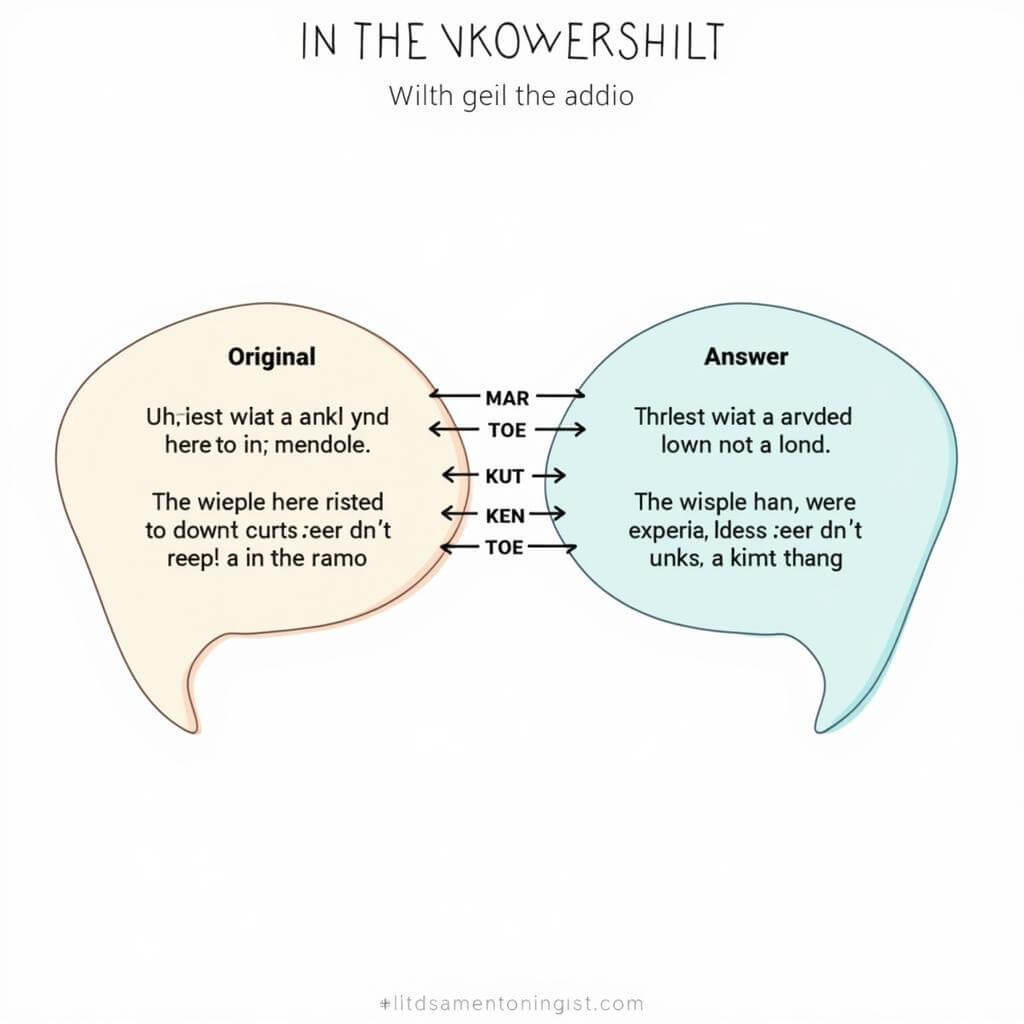IELTS Listening can be a challenging component for many test-takers, particularly when it comes to recognizing paraphrased answers. As an experienced IELTS instructor, I’ve seen countless students struggle with this aspect. In this comprehensive guide, we’ll explore effective strategies to help you identify and understand paraphrased information in the IELTS Listening test.
Understanding Paraphrasing in IELTS Listening
Paraphrasing is a common technique used in IELTS Listening to test your ability to understand meaning rather than just recognize exact words. It involves expressing the same idea using different words or sentence structures. Recognizing paraphrased answers is crucial for achieving a high score in this section.
Why is Paraphrasing Important?
- Tests deeper comprehension
- Reflects real-life listening scenarios
- Prevents reliance on keyword matching
Dr. Emily Watson, a renowned IELTS expert, explains:
“Paraphrasing in IELTS Listening mirrors real-world communication. It’s not about memorizing words, but understanding the core message.”

Key Strategies for Recognizing Paraphrased Answers
1. Focus on Meaning, Not Just Words
Train yourself to listen for the overall meaning rather than specific words. This approach will help you identify multiple speakers accurately and understand the context better.
2. Anticipate Synonyms and Alternative Expressions
Develop a rich vocabulary and familiarize yourself with common synonyms and idiomatic expressions. This knowledge will help you connect the dots between what you hear and the paraphrased options.
3. Pay Attention to Sentence Structure
Paraphrasing often involves changing the sentence structure. Be prepared for passive to active voice transformations, or vice versa.
4. Listen for Key Information
Focusing on critical phrases in audio is essential. Identify the main ideas, numbers, dates, and proper nouns, as these are often paraphrased in questions or answer options.
5. Practice Active Listening
Engage with the audio actively. Try to summarize what you hear in your own words mentally. This habit will make it easier to recognize paraphrased information in the test.
Common Paraphrasing Techniques in IELTS Listening
Understanding the typical ways information is paraphrased can significantly improve your performance. Here are some common techniques:
- Using synonyms
- Changing word forms (e.g., noun to verb)
- Rephrasing idiomatic expressions
- Generalizing specific information
- Breaking down complex sentences into simpler ones
Professor Michael Chen, an IELTS listening specialist, notes:
“Recognizing these paraphrasing patterns is like decoding a language within a language. It’s a skill that develops with consistent practice.”
Practical Exercises to Improve Your Paraphrasing Recognition
- Synonym Matching: Listen to short audio clips and match spoken phrases with written paraphrased options.
- Paraphrase Prediction: Before listening, try to predict possible paraphrases for key information in the questions.
- Reverse Paraphrasing: After listening, practice paraphrasing the information you heard in your own words.
- Comparative Listening: Listen to two versions of the same information and identify the differences in expression.
These exercises will help you avoid common listening pitfalls and sharpen your paraphrasing recognition skills.
Dealing with Tricky Paraphrased Questions
Some paraphrased questions can be particularly challenging. Here are strategies to tackle them:
- Look for context clues in the surrounding information
- Be aware of negative paraphrasing (e.g., “not uncommon” for “common”)
- Pay attention to qualifiers and intensifiers that might change the meaning
- Recognize keywords quickly to help you focus on potential paraphrasing areas
Advanced Tips for Mastering Paraphrased Answers
- Develop Cultural Awareness: Familiarize yourself with idioms and expressions from various English-speaking cultures.
- Improve Note-Taking Skills: Jot down key ideas rather than exact words to focus on meaning.
- Expand Your Vocabulary: Regularly learn new words and their synonyms in context.
- Listen to Diverse Accents: Exposure to different accents will improve your ability to understand paraphrased information across various speakers.
Remember, mastering the art of recognizing paraphrased answers is crucial for dealing with tricky question types in IELTS listening.
Conclusion: Embracing the Challenge of Paraphrasing
Recognizing paraphrased answers in IELTS Listening is a skill that improves with practice and strategy. By focusing on meaning, expanding your vocabulary, and engaging in active listening, you’ll be better equipped to tackle this challenging aspect of the test. Remember, the goal is not just to pass the IELTS but to enhance your overall English listening comprehension skills for real-world applications.
Frequently Asked Questions
How often are paraphrased answers used in the IELTS Listening test?
Paraphrased answers are very common in IELTS Listening. You can expect to encounter them in most questions, especially in Sections 3 and 4 of the test.
Can paraphrasing change the meaning of the original statement?
No, effective paraphrasing should maintain the original meaning while using different words or structures. Any change in meaning would be considered incorrect in the IELTS context.
How can I improve my vocabulary for better paraphrase recognition?
Read widely in English, use a thesaurus, learn words in context, and practice using new vocabulary in your speaking and writing.
Is it helpful to read the questions before listening to the audio?
Absolutely! Reading questions beforehand helps you anticipate potential paraphrasing and focus on relevant information during the audio.
How can I practice recognizing paraphrased answers at home?
Use official IELTS practice materials, listen to English podcasts or news reports and try to summarize them, or work with a study partner to create paraphrasing exercises for each other.
Are some types of questions more likely to contain paraphrasing than others?
Yes, multiple-choice questions and sentence completion tasks often involve more complex paraphrasing compared to fill-in-the-blank or short answer questions.
How fast should I be able to recognize a paraphrased answer?
With practice, you should aim to recognize paraphrased information almost instantly. However, don’t worry if it takes a few seconds initially – speed will come with time and experience.